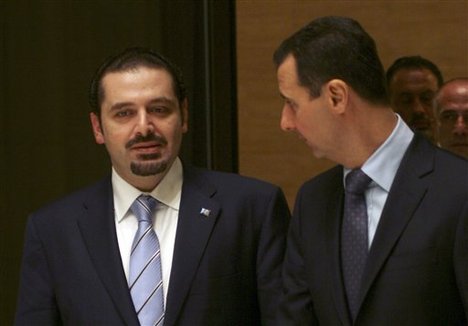Lebanon Foreign Relations
The most serious foreign policy challenge facing both the government and the economy is another war with Israel. All political parties, including Hezbollah, are committed to developing the nation’s military forces. But all also agree that until a national army is ready, Hezbollah’s armed groups may again be relied upon in the event of an Israeli attack.
Challenges—Foreign Policy
The most serious foreign policy challenge facing both the government and the economy is another war with Israel. All political parties, including Hezbollah, are committed to developing the nation’s military forces. But all also agree that until a national army is ready, Hezbollah’s armed groups may again be relied upon in the event of an Israeli attack.
Meanwhile, Prime Minister Hariri has been visiting major capitals—including Lebanon’s neighbors: Jordan, Syria, Turkey, Iraq, and Egypt—to shore up international support for Lebanon. On his recent visit to Washington, he secured President Obama’s commitment to “strengthening Lebanon’s sovereignty and independence and to continuing a wide-ranging and long-term partnership.”

In the statement of Ministerial principles issued by the cabinet in December 2009, the government committed itself to: a strong national defense force under the direction of the state and not private militias  (though until that is achieved, Hezbollah will remain armed and ready to defend the nation); solidarity with other Arab states as well as “with the Palestinian cause and the legitimate rights of its people in facing Israel and its aggressions”; and “recovery back of the Shebaa Farms, Kfarshouba Hills, and the Lebanese part of the occupied village of Ghajar” (relatively small areas along the border militarily occupied by Israel).
(though until that is achieved, Hezbollah will remain armed and ready to defend the nation); solidarity with other Arab states as well as “with the Palestinian cause and the legitimate rights of its people in facing Israel and its aggressions”; and “recovery back of the Shebaa Farms, Kfarshouba Hills, and the Lebanese part of the occupied village of Ghajar” (relatively small areas along the border militarily occupied by Israel).
All of these encourage stronger ties with other Arab states. Lebanon has, for example, reestablished diplomatic relations with Syria after expelling its troops in 2005. This is despite the investigation of an international tribunal about whether Syria was behind the assassination of Prime Minister Rafik Hariri in 2005 and other assassinations.
Since Hezbollah has been labeled a “terrorist organization” by both the United States and Israel, while holding a one-third share in the government and a veto over the other two-thirds, Lebanon faces considerable criticism

Nevertheless, the government is eager to stress
its national unity and reconciliation credentials,
which play well with other Middle Eastern and Muslim states.
A good example of the working of this approach is the recent UN Security Council vote on sanctions against Iran. The cabinet split 14-14, and after delaying Lebanon’s vote for over an hour while the debate in cabinet took place, the final result was to instruct its delegate to abstain, much to the disappointment—and relief—of the different sides, including the United States and Israel on one side, and Iran, Syria, and other Arab states on the other.
In the spirit of national reconciliation and unity, all parties including Hezbollah remain committed to
“the unity of the state and its exclusive authority,”
and to the building up of the national military services to eventually become adequate to provide the sole security for the nation.

As this is written, however, tensions with Israel are high, with threats of retaliatory actions by each side against the other if certain things occur. Lebanese ships are preparing to leave for Cyprus where they will embark for Gaza with humanitarian supplies. Threats and counter threats are being traded over what may transpire. Similarly, Hezbollah is issuing threats if its leader, Hassan Nasrallah, is assassinated, Israel will be held accountable. It is too early to tell whether or not this is rising above the normal decibel level.
The best prism through which to understand events as they unfold is through the eyes of Mohamed Chatah , Advisor to Prime Minister Hariri on foreign policy, who sees them this way:
“This is a complex region and Lebanon is a complex country. That complicates matters for policy makers and their advisors but it is a blessing as much as it is a curse. Lebanon is a very unique country with a rich mix of groups, cultures, and views squeezes into 10,000 km of beaches and mountains. The politics of the middle east are very complicated and at times dangerous. As recently as a few years ago Lebanon experienced this in the war of 2006 but since then Lebanon has recovered impressively and has grown despite the world wide recession. In addition to growth we have also experienced a peaceful Lebanon that has attracted people from around the world and this has been a factor in the high growth rate we have had. The current PM realizes Lebanon can still do a lot better than it is doing now even though it is the best among the non-oil rich Arab countries. Our wealth is in the Lebanese people and they will allow us to bridge the development gap we currently face. Furthermore, the need for peace is a very important issue not only for us but for the world; it is everyone’s cause.”